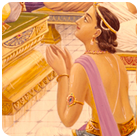When he was about to return to his country, he remembered that his
people had asked him to bring to them an Indian yogi. They had heard
a lot about yogis and were very desirous of seeing one, meeting him,
hearing him speak and receiving his blessings. Alexander was told
that the yogis dwelt in the forest.
In quest of a yogi he went to a forest. Sure enough, he found one
sitting underneath a tree, in deep meditation. He waited patiently
until the yogi opened his eyes. They shone with a strange, mystic
light.
Reverentially, Alexander requested the yogi to accompany him to Greece,
saying. “I will give you everything you need or ask for. But, pray,
do come with me. My people would love to meet you!”
The yogi quietly answered, “I need nothing, I am happy where I am!”
This was the first time that anyone had turned down Alexander’s
request. He could not control himself. He flew into a rage.
And unsheathing his sword, he thundered, “Do you know who is speaking
to you? I am the great king Alexander. If you will not listen to me,
I shall kill you – cut you into pieces!”
Unperturbed, the yogi answered. “You cannot kill me! You can only
kill my body. And the body is but a garment I have worn. I am not the
body. I am that which dwells within the body! I am not the deha. I am
the dehin – the in dwelling one!”
The yogi continued, “You say you are a king. May I tell you, who you
are? You are a slave of my slave!”
Stunned. Alexander asked. “How am I a slave of your slave?”
In a voice tender with compassion, the yogi explained. “I have
mastered anger. Anger is my slave. See, how easily you gave way to
anger. You are a slave of anger, and, therefore, a slave of my
slave!”
Moral of the story:
Undoubtedly, anger can be safely declared as one of the immediate causes of a lot of heartache and ruin.
In fact, it has been declared as one of the three gateways to hell in Bhagavad Gita, verse 16.21.
Krishna’s advice to us is –
tri-vidhaṁ narakasyedaṁ
dvāraṁ nāśanam ātmanaḥ
kāmaḥ krodhas tathā lobhas
tasmād etat trayaṁ tyajet
Translation
‘There are three gates leading to this hell–lust, anger and greed. Every sane man should give these up, for they lead to the degradation of the soul.’
Although we do not want to be a slave to this emotion, we end up being one, more often than not. So, let us look at what Krishna’s Rule Book says about anger and how it can be conquered.
In order to control our anger it is important to look at the root cause of it. Merely treating the symptom is not enough. Krishna has explained the three aspects of anger in the Bhagavad Gita:
- What causes one to get angry
- Consequences of falling prey to this emotion, and
- Of course, the solution to curb it.
Cause-Verse 2.62
dhyāyato viṣayān puṁsaḥ
saṅgas teṣūpajāyate
saṅgāt sañjāyate kāmaḥ
kāmāt krodho ’bhijāyate
Translation
While contemplating the objects of the senses, a person develops attachment for them, and from such attachment lust develops, and from lust anger arises.
Lord Krishna explains in the above verse that getting angry is a four step process.
- Our senses come In contact with a sense object. Sense object refers to anything that we see, hear, taste, touch or smell or even something that we think of in our minds.
- After the first point of contact we develop an attachment or liking for it.
- The obvious third step is to develop a desire (lust) to possess it or have it done our way.
- And finally when that does not occur, the emotion manifests as anger.
So it appears as though the problem first arises when the senses come in contact with their sense objects. Therefore, the easiest solution must be to just control our senses and nip it in the bud. Well, that’s easier said than done!
We will discuss about the solution shortly, but let us look at the consequences of being a slave to this emotion and the damage it brings on.
Consequences
Verse 2.63
sammohāt smṛti-vibhramaḥ
smṛti-bhraṁśād buddhi-nāśo
buddhi-nāśāt praṇaśyati
Translation
From anger arises delusion, and from delusion, bewilderment of memory. When memory is bewildered, intelligence is lost, and when intelligence is lost, one falls down again into the material pool.
This is also a four step process as illustrated below:
- When anger takes over the better side of us, we are in total delusion.
- We feel disoriented, completely confused and unsure as to what is going through our minds.
- We lose our capacity to use our intelligence diligently and end up doing things we shouldn’t do.
- This results in our final fall down to a point of no recovery.
Solution
Each of us might have our own way of controlling anger like going for a walk, reading a book, listening to music or just remaining silent. Each of these techniques might be working very well for us. But do they work all the time? That is something known only to the individual exercising those techniques.
Although these options may work at times, they are not foolproof. This is because we are trying to exercise the techniques after anger has taken over our intelligence, basically to suppress the emotion rather than stopping it from arising in the first place. The reason that these options are not faultless is because we try to fight our senses singlehandedly.
We pretty much underestimate the power of our senses. Krishna says thatthe senses are so strong and impetuous that they forcibly carry away the mind even of a man of discrimination who is endeavoring to control them – verse 2.60. And that even one roaming sense is enough to sway our intelligence – verse 2.67.
Our senses are responsible for our incessant flow of desires and we have to remain undisturbed, just as an ocean, which is ever still even when the rivers flow into it.
In fact, Arjuna asks this very same question to Krishna,
‘Why do we still commit sinful acts as if engaged by force?’
Krishna answers that the root cause of this problem is lust or desire alone, which when unsatisfied, turns into anger. This is stated beautifully in the following verse:
Verse 3.37
rajo-guṇa-samudbhavaḥ
mahāśano mahā-pāpmā
viddhy enam iha vairiṇam
Translation
It is lust only, Arjuna, which is born of contact with the material modes of passion and later transformed into wrath, and which is the all-devouring, sinful enemy of this world.
Lust is our eternal enemy that can never be satisfied. Our senses are responsible for our incessant flow of desires. This being the cause of wrath, we have to understand where lust actually resides within this human body and then how to curb it.
Verse 3.40 of the Bhagavad Gita explains that the residential quarters of lust are our senses, mind and intelligence.
Now that we have identified our true enemy, we have to look at ways to conquer this very powerful enemy in the form of lust, and the good news is that we don’t have to do it all alone.
Verse 6.35
asamsayam maha-baho
mano durnigraham calam
abhyasena tu kaunteya
vairagyena ca grhyate
Translation
O mighty-armed son of Kunti, it is undoubtedly very difficult to curb the restless mind, but it is possible by constant practice and by detachment.
Krishna advises us to do that by-
- Regulating our senses by engaging them in the service of the Lord. Or at least withdraw our senses when they should not be used – remember the example of the tortoise we spoke about in the introduction? Withdrawing our senses can be very difficult, given our mind does the job of all our senses singlehandedly – at times by imagining and concocting things. Therefore,
- We must endeavour to steady our minds by deliberate spiritual intelligence
Thus knowing oneself to be transcendental to material senses, mind and intelligence, one should control the lower self by the higher self and thus–by spiritual strength, conquer this insatiable enemy known as lust.
- Spiritual strength is the only way to conquer this eternal enemy. Therefore it is absolutely essential that each and every one of us look at ways to develop this strength which lies dormant within us.
And unless we curb lust, it is next to impossible to conquer anger which is simply a manifestation of unsatisfied desires.
( Dear readers please comment on this stories )
Hare Krishna, Hare Krishna, Krishna Krishna, Hare Hare
Hare Rama, Hare Rama, Rama Rama, Hare Hare.
PS: I humbly request all the devotees to please forward and share this moral / instructive stories they hear so that everyone can be benefited by hearing about Krishna and his dear devotees.



